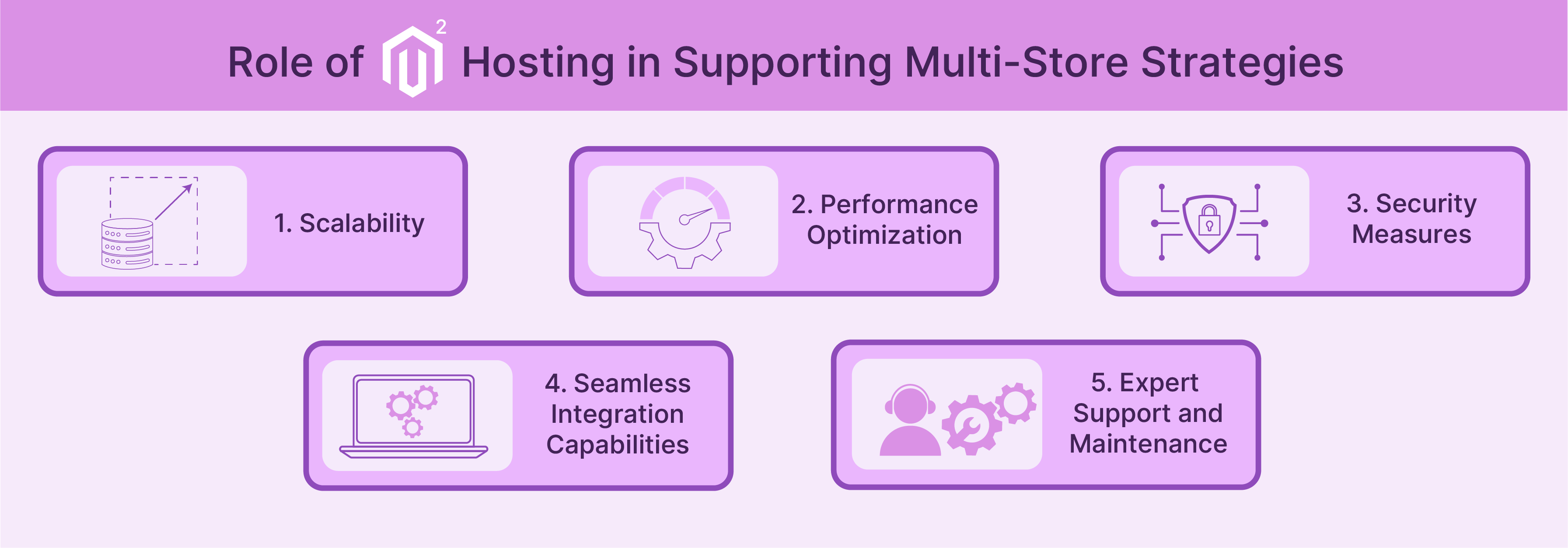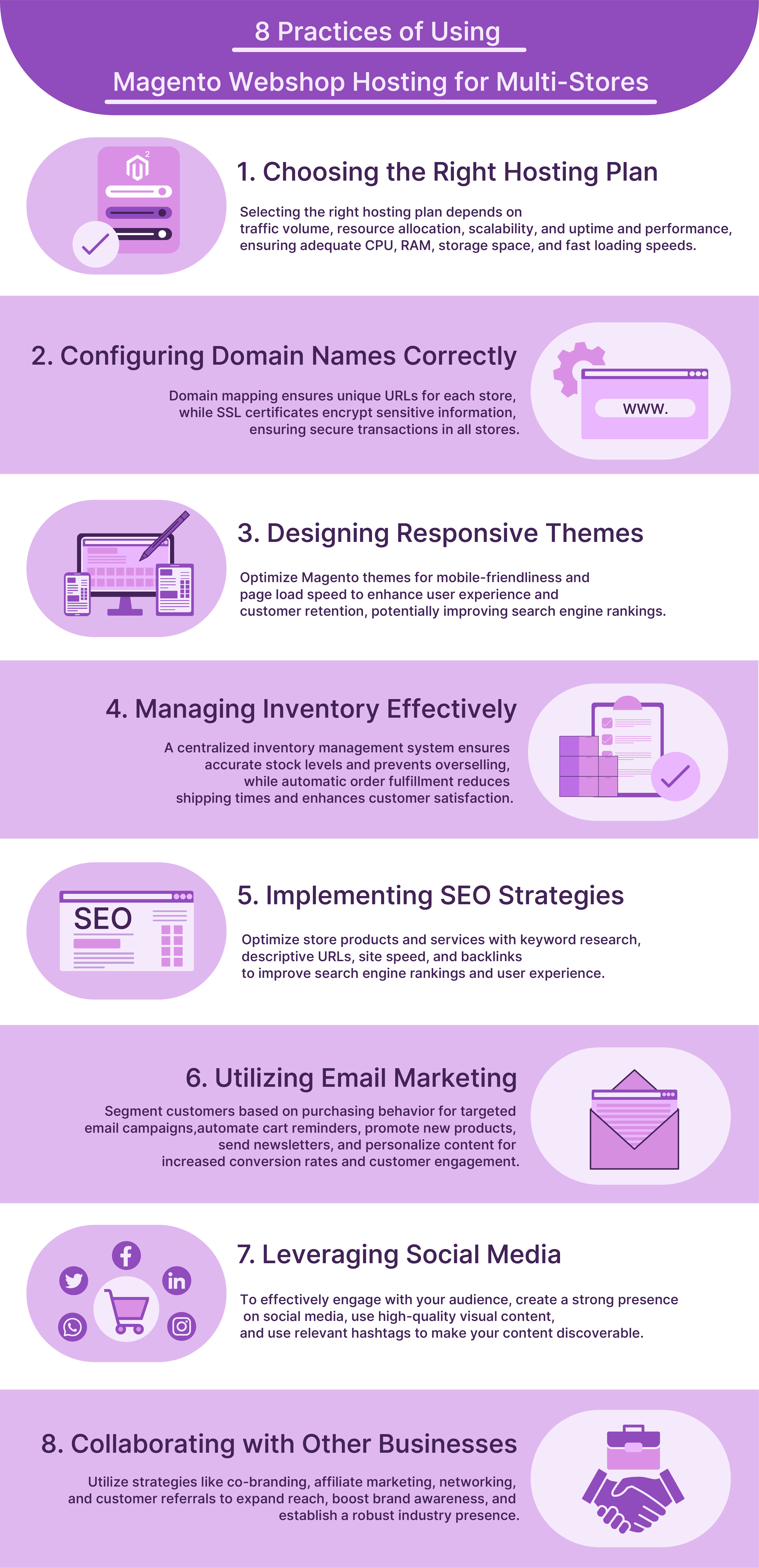
Magento 2 Webshop Hosting: Support Multi-Store Strategies
Want to manage many e-commerce shops from one interface? Magento 2 webshop hosting does this and helps you enhance customer shopping experience. You can create and manage many storefronts through a single Magento admin panel. This article discusses the features of Magento 2 webshop hosting for multi-store strategies.
Key Takeaways
-
Learn how Magento 2 webshop hosting simplifies managing many e-commerce stores.
-
Explore the features and benefits of Magento 2 hosting for multi-store strategies.
-
Grasp how multi-store strategies can target various markets and customer segments.
-
Explore the key components and advantages of implementing multi-store strategies for e-commerce businesses.
-
Discover how Magento 2 hosting supports multi-store strategies through scalability, performance optimization, etc.
-
Role of Magento 2 Hosting in Supporting Multi-Store Strategies
-
8 Practices of Using Magento Webshop Hosting for Multi-Stores
What is Magento 2 Webshop Hosting?
Magento 2 Webshop Hosting is a hosting service. It caters to online ecommerce shops. These shops use the Magento 2 platform. It offers all the features essential for running an online shop, such as:
-
Fast page load speeds
-
Secure transactions
-
Easy scalability
-
Customizable design and themes
-
Analytics and reporting tools
-
SEO optimization
What are Multi-Store Strategies?

Multi-store strategies involve operating several e-commerce stores under a single administrative interface. These strategies allow businesses to target different markets, customer segments, or product lines.
The aim is to meet diverse customer needs. It helps expand market reach. It also increases revenue opportunities without adding much complexity.
Key Components
| Feature | Description |
|---|---|
| Centralized Management | You manage all stores through a single dashboard. Simplifies handling inventory, orders, and customers. |
| Market Segmentation | Businesses target specific groups. Each store focuses on a unique audience, with its own branding. |
| Product Differentiation | Allows for different product lines. Exclusive items can be on separate platforms, useful for testing. |
Advantages
| Benefit | Description |
|---|---|
| Enhanced Customer Experience | Customizing stores for specific audiences improves satisfaction. |
| Increased Visibility | Having many stores increases your online presence, capturing a wider audience. |
| Operational Efficiency | A unified backend makes managing many stores easier, reducing complexity. |
Implementation Considerations
| Consideration | Description |
|---|---|
| Brand Consistency vs. Diversity | It's important to balance a unified brand identity. Each store's uniqueness should also be a priority. |
| SEO and Marketing Strategies | Each store needs its Magento SEO and marketing approach. This ensures it reaches its intended audience. |
| Technical and Operational Support | The hosting should support multi-store functionality. Magento 2 webshop hosting is one example. Adequate support and resources are essential for smooth operations. |
Role of Magento 2 Hosting in Supporting Multi-Store Strategies

1. Scalability
-
Elastic Resource Allocation: Magento 2 hosting can divide resources. It ensures each store performs, regardless of traffic spikes or seasonal demands.
-
Multi-Store Management: The platform allows for adding and managing many stores. It takes place from a single dashboard, facilitating smooth scaling.
2. Performance Optimization
-
User Retention: Fast loading times and smooth browsing are essential. They keep customers engaged across all stores.
-
SEO Benefits: Performance impacts search rankings. Optimized stores enjoy better visibility.
-
Caching Mechanisms: Technologies like Varnish and Redis improve response times.
-
Content Delivery Network (CDN): A Magento CDN ensures fast content delivery worldwide. This is vital for stores targeting global markets.
3. Security Measures
-
Increased Attack Surface: Many stores can mean more vulnerabilities. Each store offers entry points for attackers.
-
Data Protection: Safeguarding customer data from theft is a top priority for retailers. Encryption, firewalls, and secure payment gateways are some of the measures used.
-
Regular Updates and Patches: These reduce vulnerabilities in Magento 2 platforms.
-
Advanced Firewalls and Intrusion Detection Systems (IDS): These tools block malicious traffic. They also check for suspicious activities.
4. Seamless Integration Capabilities
-
Third-Party Services: It supports integration with payment gateways, shipping providers, and more. It simplifies operations across stores.
-
API Access: Robust APIs allow for custom integrations. It enhances functionality and user experience.
5. Expert Support and Maintenance
-
Technical Help: Expert support is available to troubleshoot. You can also get advice on maintenance and repairs.
-
Proactive Maintenance: Hosting providers offer maintenance services. These keep the Magento 2 platform and its extensions updated and optimized.
Implementing Multi-Store Strategies with Magento 2 Hosting
1. Store Management

-
Unified Dashboard: Magento 2 provides a centralized dashboard for managing many stores. It allows easy oversight of sales, inventory, and customer interactions across all stores.
-
Role-Based Access Control: Admins can assign specific permissions to team members. It ensures that staff can only access the necessary information and functions.
2. Customization and Flexibility

-
Theme Variations: Magento 2 hosting supports using different themes for each store. Businesses can tailor design to match the store’s branding and customer expectations.
-
Extension Use: A wide range of Magento extensions is available. These add specific functionalities like.. to meet the unique needs of each store.
-
Easy Modifications: Store owners can change themes and functionalities. You can do this without affecting the core operations of other stores.
-
Test Environments: Magento 2 hosting often includes staging environments. These allow for testing changes before applying them live, ensuring smooth user experiences.
3. Data Management and Integration

-
Centralized Data Management: Magento 2’s architecture supports centralized data handling. This includes customer information, product data, and inventory levels. It facilitates consistent and accurate data across all stores.
-
Segmented Reporting: Businesses can generate reports for individual stores or consolidated reports. This provides insights into performance, trends, and areas for improvement.
-
ERP and CRM Integration: Magento hosting allows integration with ERP and Magento CRM systems. This integration helps streamline operations and improve customer relationships.
-
Third-Party Tools: The platform allows for integrating various third-party tools and services. These include payment gateways, shipping providers, and marketing automation tools. This enriches the store's functionality and improves operational efficiency.
8 Practices of Using Magento Webshop Hosting for Multi-Stores

1. Choosing the Right Hosting Plan
-
Traffic Volume: Consider the expected traffic volume in all stores. This helps select a plan that can accommodate fluctuations in website visits.
-
Resource Allocation: Each store requires enough resources to operate . Ensure the hosting plan provides adequate CPU, RAM, and storage space.
-
Scalability: As businesses grow, so will their stores' needs. Ensure the hosting plan can accommodate increased traffic and resource requirements.
-
Uptime and Performance: A reliable hosting service should guarantee high uptime. It should also ensure fast loading speeds for all stores, even during peak periods.
2. Configuring Domain Names
-
Domain mapping: Map each store's domain name to its subdirectory in the server’s file system. It ensures that each store has a unique URL and can function.
-
SSL Certificates: SSL certificates encrypt sensitive information, such as payment details. Install them for each domain to ensure secure transactions in all stores.
3. Designing Responsive Themes
-
Mobile-Friendliness: Ensure the Magento themes used for each store are responsive. It also ensures they match for different devices. This improves user experience and increases customer retention.
-
Page Load Speed: Optimize images, code, and other elements on the website. It improves loading speeds. This enhances user experience and can impact search engine rankings.
4. Managing Inventory
-
Centralized Inventory: A centralized inventory management system tracks stock levels across all stores. This ensures accurate stock levels and prevents overselling.
-
Order Fulfillment: Set up a system to fulfill orders. It ensures this from the nearest warehouse or store location. This reduces shipping times and improves customer satisfaction.
5. Implementing SEO Strategies
-
Keyword Research: Identify relevant keywords for each store's products and services. Use tools like Google Keyword Planner for this. Incorporate these keywords into product descriptions, meta titles, and content. This will improve search engine rankings.
-
URL Structure: Use descriptive and keyword-rich URLs. Do it for each store's products and categories. This makes it easier for search engines to crawl and index the website.
-
Site Speed: As mentioned earlier, optimizing site speed enhances the Magento user experience. It also affects search engine rankings. Search engines favor faster websites, so monitoring and improving site speed is important.
-
Backlinks: Building backlinks from reputable websites can also improve search engine rankings. Reach out to bloggers and industry publications. Get your products or services featured on their websites.
6. Utilizing Email Marketing
-
Customer Segmentation: Segment customers based on purchasing behavior. It helps you create targeted email campaigns for each segment. This personalized approach can lead to higher open and click-through rates.
-
Abandoned Cart Emails: Set up automated emails. It will remind customers of items left in their cart. It can help recover potential lost sales and improve conversion rates.
-
Promotional Emails: Use email marketing to promote new products, sales, or promotions. This can drive traffic to specific store locations or product pages.
-
Email Newsletters: Sending newsletters keeps customers engaged. They stay updated on new products, events, or company news. This can also help build brand loyalty.
-
Personalization: Use customer data to personalize email content. Include their name. Include their past buy history. This can make emails more relevant and increase the chances of conversion.
7. Leveraging Social Media
-
Know Your Audience: Understand which social media platforms your target audience uses. Create a presence on those platforms. Focus on building a strong following and engaging with your audience.
-
Visual Content: Use high-quality images and videos to showcase products or services. Visuals can attract more clicks and shares on social media.
-
Hashtags: Use relevant hashtags to make your content more discoverable by potential customers. Research popular hashtags in your industry and use them in your posts.
-
Influencer Marketing: Collaborate with influencers in your industry. This will help you reach a larger audience. It will also gain you credibility. This can include sponsored posts, reviews, or giveaways.
-
User-Generated Content: Encourage customers to share their experiences with your brand. They can share it on social media. This type of content can be more authentic and engaging for potential customers.
-
Social Media Advertising: Consider investing in paid advertising on social media platforms. It helps you reach a targeted audience and drive traffic to your website.
-
Engage with Followers: Respond to comments, messages, and tags from followers. This can help build relationships and foster customer loyalty.
8. Collaborating with Other Businesses
-
Partnerships: Collaborate with complementary businesses to cross-promote each other's products or services. This can expand your reach and introduce your brand to new audiences.
-
Co-Branded Campaigns: Create joint Magento marketing campaigns with other businesses. Such businesses should share similar values or target the same audience. This can also help increase brand awareness and credibility.
-
Affiliate Marketing: Partner with affiliates to promote your products or services. You can do it in exchange for a commission. This can be an effective way to reach a larger audience and drive sales.
-
Share Resources: Consider sharing resources or knowledge with other businesses in your industry. This can help establish you as an expert and build beneficial relationships.
-
Attend Networking Events: Attend events and conferences related to your industry. You can meet potential collaborators and expand your network. Building strong relationships with other businesses can lead to future partnerships and opportunities.
-
Host Collaborative Events: Organize joint events or workshops with other businesses. It will attract a larger audience and increase brand exposure. This can also help establish your brand as a leader in your industry.
-
Sponsorships: Consider sponsoring events or organizations. They should align with your brand values and target audience. This can be an effective way to build brand awareness and support causes you care about.
-
Support Local Businesses: Collaborate with businesses. You can do this to support each other and build a strong community. This can also attract customers who focus on supporting small businesses.
-
Customer Referrals: Encourage satisfied customers to refer their friends and family. Consider offering referral incentives, such as discounts or rewards, to encourage more referrals.
FAQs
1. What is the difference between shared and dedicated hosting for Magento stores?
Shared hosting is a cost-effective solution. Many websites share the same server resources. It makes it ideal for new or small Magento stores.
But, dedicated hosting provides a dedicated server for your online store. It offers optimal performance and security for high-traffic Magento sites.
2. How do I choose the best Magento hosting provider in 2024?
When selecting the best Magento hosting provider, consider several factors. Look at uptime reliability and customer support. Examine the hosting environment. Look for optimized Magento solutions.
Providers like MGT-Commerce and InMotion Hosting are popular. They have a strong reputation for hosting e-commerce.
3. Can Magento 2 run on a shared hosting plan?
Yes, Magento 2 can run on a shared hosting plan. This is an affordable option for Magento users with smaller stores.
A dedicated or managed VPS hosting solution is better for optimal performance. It's ideal for growing or large ecommerce platforms.
4. What are the benefits of managed hosting for Magento stores?
Managed hosting for Magento stores provides various benefits. These include enhanced Magento performance and security updates. Magento experts provide server monitoring and technical support.
The managed Magento hosting solution lets you concentrate on your business. Hosting companies take care of the technical aspects.
5. Which hosting type is best for a Magento website?
The best hosting for a Magento website depends on your specific needs. A shared hosting solution is for startups.
A dedicated server is better suited for high-traffic online stores. A managed VPS hosting plan also works well. This is due to their better scalability, security, and performance.
6. How important is a free SSL certificate for an online store?
A free SSL certificate is crucial for an online store. It encrypts data, ensuring customer information is secure. This improves Magento site security, boosts customer trust, and enhances search engine rankings.
7. Are Magento hosting providers specializing in Magento 1 and Magento 2?
Yes, some hosting providers specialize in both Magento 1 and Magento 2. They offer optimized Magento hosting platforms.
These providers ensure a suitable hosting environment. This includes top Magento 2 hosting providers. They support all ecommerce platform versions.
8. What makes Magento server hosting different from generic web hosting services?
Magento server hosting suits the Magento ecommerce platform. This ensures better Magento performance, security, and support from Magento experts.
Generic web hosting services may lack a Magento-optimized environment. They may also lack the technical expertise required for ecommerce hosting.
9. Why is choosing the best hosting provider for Magento 2 important?
Choosing the best hosting provider for Magento 2 is essential. It impacts your Magento store's uptime, speed, and performance. The right provider offers an optimized Magento hosting solution.
They provide robust security measures, including free SSL certificates and dedicated support. This can enhance your Magento site's user experience and reliability.
Summary
Magento 2 webshop hosting provides centralized management, scalability, and better customer experiences. Key features are:
-
Enables easy management of several e-commerce stores.
-
Supports effective market segmentation.
-
Improves operational efficiency.
Want to expand your market reach with less complexity? Learn how managed Magento 2 hosting can help handle your infrastructure.



